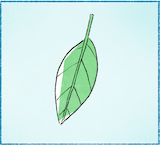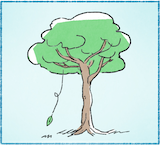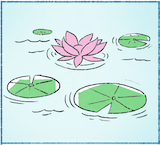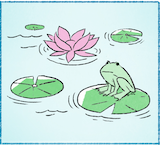



นี้คืออี่หยัง นี้คือใบไม้
ใบไม้มีจักใบ ใบไม้มีใบเดียว
ใบไม้สีอี่หยัง ใบไม้สีเขียว
ใบไม้คือสีเขียว บ่ลู้คือกัน ใบไม้ใบนี้อาดสิอ่อนอยู่ เพาะว่าขั้นใบไม้อ่อนหลือใบไม้สดมันสิเป็นสีเขียว
ขั้นใบไม้แห้ง มันสิเป็นสีน้ำตานหลือสีดำ
14
นี้คืออี่หยัง นี้คือต้นไม้
ต้นไม้มันเป็นอี่หยัง ต้นไม้มันมีใบไม้หล่นลงจากต้นไม้
ใบไม้หล่นลงจักใบ ใบไม้หล่นลงใบเดียว
ใบไม้ใบใหญ่บ่ บ่ ใบไม้ใบบ่ใหญ่ ใบไม้ใบน้อยๆ น้อยอิ่จิ่หนึ่ง
ต้นไม้ต้นใหญ่บ่ ใหญ่อยู่ ต้นไม้ต้นใหญ่บักคัก ต้นใหญ่บักคักหนึ่ง
ต้นไม้มีจักต้น ต้นไม้มีต้นเดียว ต้นเดียวข้อหล้อ
15
นี้คืออี่หยัง นี้คือสวนดอกบัว
สวนดอกบัวอันอยู่ใส สวนดอกบัวอันอยู่ในน้ำ
สวนดอกบัวมีอี่หยังแน่ สวนดอกบัวสิมีดอกบัว แล้วกะมีใบบัว
ดอกบัวสีอี่หยัง ดอกบัวสีซมพู
ใบบัวสีหญัง ใบบัวสีเขียว
ใบบัวเป็นแบบใด ใบบัวเป็นวงกม ใบใหญ่ๆ
มีใบบัวจักใบ มีใบบัวสี่ใบ
มีใบบัวใบใหญ่บ่ มีอยู่ มีใบบัวใบใหญ่อยู่
มีใบบัวใบน้อยบ่ มีอยู่ มีใบบัวใบน้อยอยู่
16
นี้คืออี่หยัง อันนี้กะเป็นสวนดอกบัวคือเก่านั้นหละ
มีอี่หยังเพิ้มขึ้นมา มีกบโตหนึ่ง มันนั่งอยู่เทิงใบบัว
มันนั่งเฮ็ดหญังอยู่เทิงใบบัว บ่ลู้คือกัน มันอาดสิมานั่งหายใจ หลือมานั่งเหล้นกะได้
กบโตใหญ่บ่ บ่ กบโตบ่ใหญ่
กบมันนั่งอยู่จักโต กบมันนั่งอยู่โตเดียว
กบมันโตหนักบ่ บ่ กบมันบ่หนัก กบมันเบาๆ หนึ่ง
แล้วสวนดอกบัวนี้ มันมีน้ำหลายบ่ มีหลายอยู่ มันมีน้ำหลาย
แล้วน้ำมันลึกบ่ จักลึกหลือบ่ลึกกะบ่ลู้คือกัน บ่ได้ลงไปเบิ่ง
Link to overview page
Link to dictionary
| Isaan | Pronunciation | Tones | Thai | English/Notes |
|---|---|---|---|---|
| นี้ | ni: | HF | นี้ | 1. this 2. here |
| คือ | khʉ: | HR | คือ | 1. to be, to resemble, like, as 2. why {บักหล้าคือบ่เก็บโต่ะแน่ = [addressing a young boy] Why haven't you cleared the table?} |
| อี่หยัง | i:-yaŋ | H-M | อะไร | 1. what {นี้คืออี่หยัง = What is this?} {มื้อนี้เจ้าเฮ็ดอี่หยัง = What are you doing today?} {กินเข้างายกับอี่หยัง = What did you have for breakfast?} 2. something, anything, (in negations) nothing {บ่ต้องเฮ็ดอี่หยังอีกเลยนอกจากใส่ปุย = [we] don't need to do anything besides adding fertilizer} |
| ใบไม้ | bai-mai | M-HF | ใบไม้ | leaf (of a tree) |
| มี | mi: | HR | มี | 1. to have 2. there is |
| จัก | jak | M | จัก | 1. answer to a question: [I] don't know, don't know exactly, [I'm] not sure {พุซายคนนี้เขาเถ้าไป่ จัก จักเถ้าหลือบ่เถ้า เบิ่งบ่ค่อยออก = Is this man here already old? I don't know. I can't see clearly whether he's old or not.} {เขาเว้ากันอยู่ใส จักคือกัน = Where are they talking? I don't know either.} 2. exact(ly), what exactly {จักต้มอี่หยังกะบ่ฮู้ = I don't know what (exactly) he is cooking} {บ่ลู้คือกันจักปาอี่หยัง = I don't know either what kind of fish this is} 3. how much/many? {ต้นไม้มีจักต้น = How many trees are there?} {ตอนนี้จักโมงแล้ว = What time is it now?} {มือของเฮานี้สิมีจักนิ้ว = How many fingers do our hands have?} 4. a bit, a little bit {จักหน่อย/จักหน่อยหนึ่ง = a bit, a little bit} |
| ใบ | bai | M | ใบ | 1. leaf {ต้นไม้มีใบสีเขียว = the tree has green leaves} 2. banknote {เทิงมีใบพ้อม เทิงมีเหลียนพ้อม = there are notes as well as coins} 3. clf. for leaves, bank notes, helmets, bowls, jars, pots, boxes {ใบบัว = lotus leaf} {ก่องใบน้อย = a small box} {หม้อใบนี้มีฝาพ้อม = the pot here has a lid, too} {ถ้วยใบสีแดง = a red bowl} |
| เดียว | di:ao | M | เดียว | only, alone, single |
| สี | si: | M | สี | 1. color 2. colored pencil, crayon |
| เขียว | khi:ao | M | เขียว | green |
| บ่ | bɔ: | H | ไม่ | 1. no, not 2. question particle, transforming a statement into a question Notes: spelling exception in line with common usage on social media |
| ลู้ | lu: | HF | รู้ | 1. to know 2. to understand Notes: equivalent to ฮู้ |
| คือกัน | khʉ:-gan | HR-M | เหมือนกัน | 1. also, likewise, similarly {ยินดีที่ได้ฮู้จักคือกันคับ = Nice to meet you too!} 2. in negative sentences: either {บ่ลู้คือกัน = I don't know either} {จักคือกัน = I don't know (either)} |
| อาด | a:t | LF | อาจ | 1. might, may, will 2. likely |
| สิ | si | M | จะ | future tense auxiliary {เขากำลังสิตื่น = he's about to wake up} {สิไปตะหลาด = [I'm] going to the market} |
| อ่อน | ɔ:n | H | อ่อน | 1. soft 2. young |
| อยู่ | yu: | H | อยู่ | 1. to be (located) at 2. yet, still 3. auxiliary indicating continuous or progressive action {ทอดปาอยู่ในกะทะ = (in the process of) frying a fish in the pan} {แม่กำลังเมี้ยนเฮียนอยู่ = mother is cleaning/tidying up the house} |
| เพาะว่า | phɔ-wa: | H-H | เพราะว่า | because |
| ขั้น | khan | LF | เมื่อ | when, if |
| หลือ | lʉ: | M | หรือ | or |
| สด | sot | M | สด | 1. fresh 2. live |
| มัน | man | HR | มัน | it (also used to refer to people) |
| เป็น | pen | M | เป็น | 1. to be, to exist 2. to be able to 3. to suffer, sth. happens to 4. เป็นหญัง[...]คือ in initial position: why? {เป็นหญังเขากะคือแปงฟัน = Why is he brushing his teeth?} {เป็นหญังเคี่ยงบินมันคือสิตก = Why is the airplane falling down?} |
| แห้ง | hɛ:ŋ | LF | แห้ง | dry |
| น้ำตาน | na:m-ta:n | HF-M | น้ำตาล | color: brown |
| ดำ | dam | M | ดำ | 1. black 2. to transplant rice seedlings {ดำนา = to transplant rice seedlings} |
| ต้นไม้ | ton-mai | HF-HF | ต้นไม้ | tree |
| หล่น | lon | H | หล่น | 1. to drop 2. to fall off |
| ลง | loŋ | HR | ลง | 1. to descend, to lower, to go down 2. down 3. bus/train etc.: to get off, to disembark {คนกำลังลงลดบั่ด = people are getting off the bus} 4. boat/ship etc.: to get on, to board {เขากำลังญ่างลงเลีย = he's boarding/getting on the boat} |
| จาก | ja:k | LF | จาก | 1. from {... เฮ็ดมาจากอี่หยัง = ... is made from what?} 2. to depart |
| ใหญ่ | ɲai | H | ใหญ่ | large, big |
| น้อย | nɔ:i | HF | น้อย | 1. few, little 2. small |
| อิ่จิ่หนึ่ง | i-ji-nʉŋ | H-H-H | เล็กๆ | very small |
| ต้น | ton | HF | ต้น | 1. clf. for trees, plants, logs/pieces of wood {ต้นไม้ต้นใหญ่ = a large tree} {ต้นฟืน = log/piece of wood} 2. first, primary, initial {ลูกคนต้นหมู่ = first child} |
| บักคัก | bak-khak | M-H | intensifier: very, very much (variant of คัก) | |
| บักคักหนึ่ง | bak-khak-nʉŋ | M-H-H | intensifier: very, very much (variant of คัก) | |
| ข้อหล้อ | khɔ:-lɔ: | LF-LF | เท่านั้น, ขนาดนั้น, น้อยๆ | only {ต้นไม้มีต้นเดียว ต้นเดียวข้อหล้อ = there's one tree, only one tree} {มีบ้านหลังเดียวข้อหล้อ = there's only one house} |
| สวน | su:an | M | สวน | garden |
| ดอกบัว | dɔ:k-bu:a | LF-M | ดอกบัว | lotus |
| อัน | an | M | อัน | 1. thing, object 2. general clf. for objects |
| ใส | sai | M | (ที่)ไหน | 1. where? {สิไปใส = Where are [you] going?} {มาแต่ใส = Where are [you] coming from?} {กะทะอยู่ใส = Where's the pan?} 2. somewhere, anywhere {ใสกะได้ = anywhere, wherever you like} |
| ใน | nai | HR | ใน | in, within |
| น้ำ | na:m | HF | น้ำ | 1. water 2. drink, soft drink, juice |
| แน่ | nɛ: | H | แน่, บ้าง | 1. some, somewhat 2. final particle, used to ask for examples (similar to Thai บ้าง at the end of a question) {หม้อใซ้เฮ็ดอี่หยังได้แน่ = What (different things) can a pot be used for?} {น้ำอัดลมซื้อได้อยู่ใสแน่ = Where/in which places can one buy soft drinks?} 3. final particle, when giving examples {มีเทิงส้งแน่ มีเสี้ยแน่ มีเกิบแน่ = there are trousers, shirts, shoes etc.} 4. final particle, used to give a command {ไปปิดหน้าต่างให้แน่ = Close the window!} 5. final particle, acting as an intensifier, especially in the pattern ... คัก ... แน่ {สูงคักสูงแน่ = very high} {ญ้องเฮาคัก ญ้องเฮาแน่ = [he's] praising me a lot} |
| แล้ว | lɛ:o | HF | แล้ว | 1. finished 2. already 3. and then, and next (especially แล้วกะ) 4. auxiliary for past tense |
| กะ | ga | M | ก็ | 1. then, consequently 2. also |
| บัว | bu:a | M | บัว | lotus |
| ซมพู | som-phu: | HR-HR | ชมพู | pink |
| หญัง | ɲaŋ | M | อะไร, เป็นหญัง = ทำไม | 1. what {เขากำลังเฮ็ดหญัง = What is he doing?} {ธูปเอาไว้เฮ็ดหญัง = What are incense sticks for?} 2. something, anything, (nothing) 3. เป็นหญัง[...]คือ in initial position: why {เป็นหญังเขาคือใส่บักพิกลงไปในกวยเตียว = Why is he putting chili in [his] noodle soup?} {เป็นหญังหน้าต่างมันคือเปิด = Why is the window open?} {เป็นหญังมันคือมีควนไฟ = Why is there smoke?} |
| แบบ | bɛ:p | LF | แบบ | 1. example, model, kind 2. style, form, pattern, design |
| ใด | dai | M | ใด | 1. which, that one which, what, how {เขานั่งแบบใด เขานั่งขดตะหมาดอยู่ = How is he sitting? He's sitting cross-legged.} {ตอนใด = when?} 2. whichever, whoever {หม้องใดหม้องหนึ่ง = some place, somewhere} {ขั้นเฮาอยากตื่นญามใด เฮากะตั้งเวลาปุกญามนั้น = If we want to get up at a certain time, we set the alarm to that time} Notes: sentence-final often with a marked rising tone |
| วงกม | woŋ-gom | HR-M | วงกลม | 1. circle, ring, sphere 2. round |
| สี่ | si: | H | สี่ | four |
| คือเก่า | khʉ:-gao | HR-H | as before | |
| นั้นหละ | nan-la | HF-M | นั่นแหละ | auxiliary for emphasis at the end of a phrase |
| เพิ้ม | phə:m | HF | เพิ่ม | 1. to add, to increase 2. plus |
| ขึ้น | khʉn | LF | ขึ้น | 1. to go up, to increase 2. sun: to rise {ตะเว็นกำลังขึ้น = the sun is rising} 3. more 4. bus/train etc.: to get on, to board {พุโดยสานขึ้นลดไฟเบิดแล้ว = all passengers have boarded the train} |
| มา | ma: | HR | มา | 1. to come 2. auxiliary expressing action towards the present or focal time {กะคุเฮ็ดมาจากอี่หยัง = What is the bucket made of?} {แล้วเขากะเก็บเงินจากพุนั้นมา = and then she takes the money of that person} |
| กบ | gop | M | กบ | frog |
| โต | to: | M | ตัว | 1. body, self 2. clf. for animals, characters/letters/consonants, appliances, clothes (e.g., pairs of trousers, shirts) |
| หนึ่ง | nʉŋ | H | หนึ่ง | 1. one 2. after adjective: intensifier {บักคักหนึ่ง = very much} {อันบักใหญ่หนึ่ง = very large}, or attenuates the meaning {กะดาดมันแผ่นน้อยๆ หนึ่ง = the piece of paper is [relatively] small} |
| นั่ง | naŋ | H | นั่ง | to sit |
| เทิง | thə:ŋ | HR | บน | 1. on, on top of, at, in {เทิงโต่ะ = at/on the table} {กบมันนั่งอยู่เทิงใบบัว = the frog is sitting on the lotus leaf} {เทิงท้องฟ้า = in the sky} {มันแล่นอยู่เทิงลาง = [the train] runs on rails} {มีคนนั่งอยู่เทิงลดสามล้อสามคน = there are three people sitting in the tuk tuk} 2. up, upward Notes: pronunciation: also realized as ทัง |
| เฮ็ด | het | H | ทำ | to do, to make |
| หายใจ | ha:i-jai | M-M | หายใจ | to breathe |
| เหล้น | len | LF | เล่น | 1. to play, to enjoy oneself with, to do something for pleasure {เหล้นลูกบอน = to play ball} {เหล้นเกม = to play a game/games} {เหล้นน้ำ = to play with/in the water} {นั่งเหล้น = to sit} {กินเหล้น = to eat (as a snack), to snack} {เหล้นโน่ดบุ่ก = to use a laptop (for entertainment or work)} 2. to drop by, to spend time with, to come to visit {บ่ได้มาเฮ็ดหญัง มาเหล้นซื่อๆ = I've not come to do anything in particular, I'm just dropping by} |
| ได้ | dai | HF | ได้ | 1. can 2. to get, to obtain 3. before verb: indicating past tense 4. บ่ได้ + verb: not |
| หนัก | nak | M | หนัก | heavy |
| เบา | bao | M | เบา | 1. weight: light 2. soft, gentle 3. volume: quiet/not loud {เปิดเพงเบาๆ = to switch on/listen to a song at moderate volume} |
| หลาย | la:i | M | เยอะ, มาก | many, much, very |
| ลึก | lʉk | H | ลึก | deep |
| ไป | pai | M | ไป | 1. to go 2. auxiliary indicating action extending into the future |
| เบิ่ง | bəŋ | H | ดู | 1. to look at, to see, to watch {เบิ่งโทละทัด = to watch TV} {เบิ่งหนัง = to watch a movie} 2. to guess {เบิ่งซงแล้ว ... = [I] guess / from what it looks like ...} |